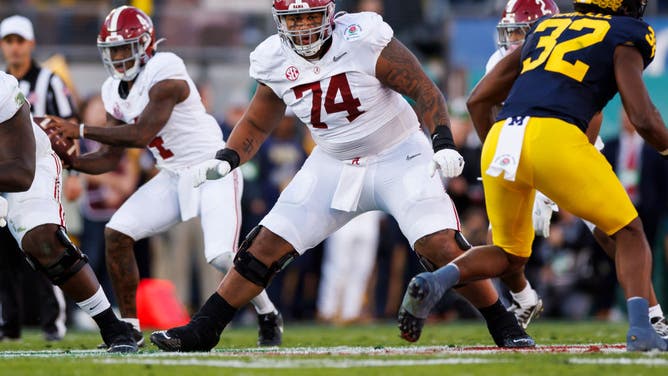New Era Of College Sports, As NCAA Approves Unlimited Transfers That Could Lead To NFL-Like Roster Cuts
The college football transfer portal window opened at the perfect time this week for players looking for a new home, thanks to the NCAA adhering to a new policy.
Just when you thought we'd seen it all with the transfer portal, the NCAA finally had to make the move to allow an unlimited amount of transfers for a student-athlete.
The NCAA Division I Council approved the move on Wednesday that will allow players to transfer to a different school and not have to sit out a year, like the previous rules stated. One of the requirements to be given this opportunity is for the player to be in good academic standing at the time they want to transfer.
This means that a player can enter the transfer portal during the winter period, then leave for another school during the spring window. If you wanted to see this play-out in real-time, look no further than former Iowa OL Kadyn Proctor.

PASADENA, CALIFORNIA - JANUARY 01: Offensive lineman Kadyn Proctor #74 of the Alabama Crimson Tide blocks during the CFP Semifinal Rose Bowl Game against the Michigan Wolverines at Rose Bowl Stadium on January 1, 2024 in Pasadena, California. (Photo by Ryan Kang/Getty Images)
Proctor left Alabama when Nick Saban retired to play for his home-state school, the Iowa Hawkeyes. But just three months after arriving back in Iowa, the talented offensive lineman entered his name back into the transfer portal, with intentions of returning to Alabama for the summer session.
There are certainly other players that have taken advantage of this new rule that wasn't voted into place until this week, but every school knew that the rule change was coming, hence the decision by Proctor and others.
"Specifically, to be immediately eligible after a transfer, undergraduate student-athletes would have to have left their previous school while academically eligible and in good standing (not subject to disciplinary suspension or dismissal) and meet progress-toward-degree requirements at their new school before competing," the NCAA release noted. "For graduate transfer student-athletes to be eligible, they would have to earn a degree from their previous school, leave while academically eligible and be enrolled as a full-time postgraduate student while continuing to satisfy minimum academic standards."
It's A Whole New World For College Athletics
Oh, how times have changed in college athletics. Just a few years ago, a player would have to sit-out one season before being declared eligible to play at their new school. It honestly feels like yesterday when players were allowed to transfer as Grad-Transfers, meaning they would not have to sit for a season if they had already received their undergraduate degree.
One of the most fascinating quotes to come out of the new policy change from the NCAA came from Lynda Tealer, who is the deputy athletics director at Florida, and also chair of the Division I Council.
"With these rule changes, NCAA members continue to prioritize long-term academic success for college athletes who transfer, while supporting their opportunity to compete immediately," Lynda Tealer said in the release. "We hope that this practical approach to transfer eligibility requirements will encourage student-athletes to make well-informed decisions about transferring and the impacts such a move could have on their ability to graduate on time in their degree of choice, particularly as it relates to transferable credits."

The NCAA has approved a new policy that will allow athletes to have unlimited transfers, as long as they are in good academic standing.
(OutKick / Trey Wallace)
This is almost to the point of uncontrolled laughter, acting as if the NCAA really cares about prioritizing ‘long-term academic success for college athletes who transfer’. That line will really prove the point that the NCAA cares about the well-being of a student-athlete.
Sure, transferring from school-to-school over the course of four years is really going to hammer home the idea that getting an education is the top priority for the NCAA. No, they were stuck in the middle of a lawsuit brought forth by attorneys general from states like Illinois, New York, Tennessee, West Virginia, Colorado and Ohio, which argued that the NCAA's restrictions on transfers violated antitrust laws.
All it took was a few more states to join in, along with the Department of Justice, and all sides agreed to allow players who had been transferred multiple times to be declared eligible to play in the Fall.
Call it whatever you like, but this is just one more step to college athletics playing within the confines of free agency.
Student-Athletes Better Prepare For Harsher Decisions From Coaches
One of the repercussions from the NCAA changing its policy on the number of times a player can transfer will fall on the athletes themselves. In a world where spots on a roster are more of a business-like exchange, the coaches will be able to start trimming their roster and advising players to hit the portal without pushback from fans or the athlete.
The athletes wanted this. Opportunities to jump from one school to the next, searching for a better monetary situation with NIL, or a higher position on the depth-chart. College coaches for years have held conversations following a regular season or spring practice about what a player's future with the program might look like will become more frequent.
If a linebacker isn't cutting it or holding up their end of the deal, the head coach will no longer worry about the public ramifications of taking away their scholarship, or telling them to look for a new home. This already happens every year, but it will certainly become more of a public conversation that coaches will be asked to discuss.
And guess what? They won't have a problem dealing with the questions because of the rules that student-athletes wanted changed. If a wide receiver is going to explore his options every six months, then it's not the coaches problems to worry about their feelings, or if they should hold a spot for them. Obviously there are different circumstances for every player and coaches are not going to run a player off just for the hell of it.
But, the circumstances surrounding the transfer portal have drastically changed over the past few years, and everyone is trying to adapt to this new era. At the end of the day, there are some harsh conversations on the horizon that will be held in the public forum.